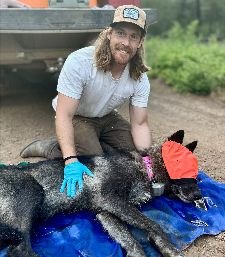November 19, 2024
Wolves: A Social and Natural History
Aaron Bott
The presence of wolves is shaped by the landscapes they inhabit and the humans who share those spaces. For millennia, wolves and humans have maintained a complex and intertwined relationship, showcasing striking similarities. Both species exhibit unique behavioral traits that are rare in the animal kingdom. While most people recognize that wolves live in groups known as packs, many may not realize that these packs function as family units.
Much like humans, wolves are among the few species on the planet that live in family groups. As cooperative breeders, they collaborate to raise their young, with parents and offspring assuming distinct roles within their intricate social structure. This fascinating aspect of wolf life highlights their remarkable adaptability and invites comparisons of social behavior, emphasizing the deep cooperation that characterizes this species.
On Tuesday, November 19, 2024, this presentation will explore the nuances of wolf social dynamics, shedding light on the various roles they assume within their complex family groups.
Aaron Bott is a wolf biologist employed by the Oregon Department of Fish and Wildlife. He is also a Wildlife Biology doctoral candidate at Utah State University. His research focuses on wolf social behavior, predation patterns, and developing innovative non-lethal techniques to mitigate conflicts with livestock.

